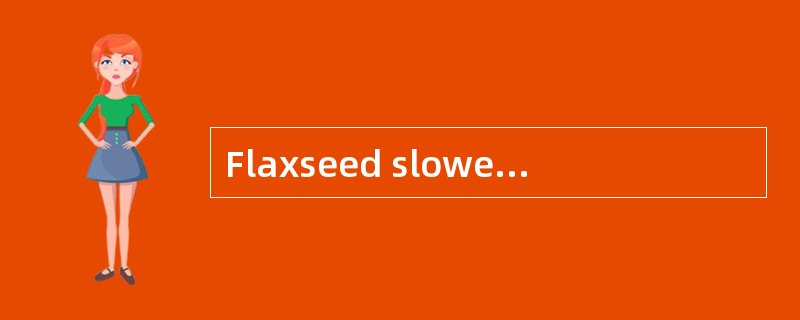Flaxseed slowedthe growth of prostate tumors in men,while ginseng helped relieve the fatiguethat cancer patients often feel,US researchers reported on Saturday in the
first scientificallyrigorous looks at alternative medicine.
2.The studiesreflect doctors' efforts to explore the risks and benefits of foods andsupplements that are routinely taken by their patients with little scientificproof they
help.Americans spendbetween¥36 billion and¥47 billion a year on complementary and alternativetherapies,according to the National Center for Health Statistics."Patients
are taking thesecompounds but we need to know if they are doing any good or any harm,"saidDr. Bruce Cheson of
a panel onalternative therapies at a meeting of the American Society of ClinicalOncology.
3.In the flaxseedstudy,researchers at
scheduled to undergosurgery for prostate cancer."The growth rate was decreased in the men whogot flaxseed,"said Dr. Nancy Davidson,an oncologist at Johns Hopkins
University inBaltimore who is president-elect of ASCO."I think this isfascinating."Flaxseed is rich in omega-3 fatty acids-and lignins,a fiberfound on the seed coat."We
were looking atflaxseed because of its unique nutrient profile,"said WendyDemark-Wahnefried,a researcher in Duke's
4.Half of the men inthe study added 30 grams of fiaxseed daily to their diets for about 30days.Half of the flaxseed group also went on a low-fat diet.After thesurgery,the
researchers looked atthe men's tumor cells to see how quickly the cancer had multiplied.The cancercells in both the flaxseed groups grew about 30 to 40 percent slower than
the control group.
5.ButDemark-Wahnefried is not ready to prescribe flaxseed."It's a healthyfood.It has a lot of vitamins and a lot of fiber. But we cannot definitivelysay at this point you
should take flaxseedbecause it is protective against prostate cancer,"she said,adding thatflaxseed now needed to be studied to see if it can prevent prostate cancer.
6.In the ginsengtrial,Debra Barton of the Mayo Clinic in
who were expected tolive at least six months. Twenty-five percent of patients taking a 1,000-mgdose and twenty-seven percent of patients taking a 2,000-mg dose said their
fatigue symptomswere"moderately better" or"much better."Only 10 percent ofthose taking a 750-mg dose reported an improvement, which was about the same asthe
placebogroup.Patients in the trial took
have predictedthis,I have to admit,"Davidson said in an interview,"we might want totest this on a large scale."
7.The flaxseed studywas funded by the National institutes of Health and the ginseng study wassupported by US Public Health Service grants.
A.The Motivation ofFlaxseed Study
B.The Study onGinseng Displays Its Good Promise
C.The Doctors'Responsibility Led Them to Carry Out These Two Studies
D.Ginseng Is As Goodto Cancer Patients As Flax-seed
E.The Methods andResults of the Study on Flax-seed
参考答案与解析:
-
相关试题
